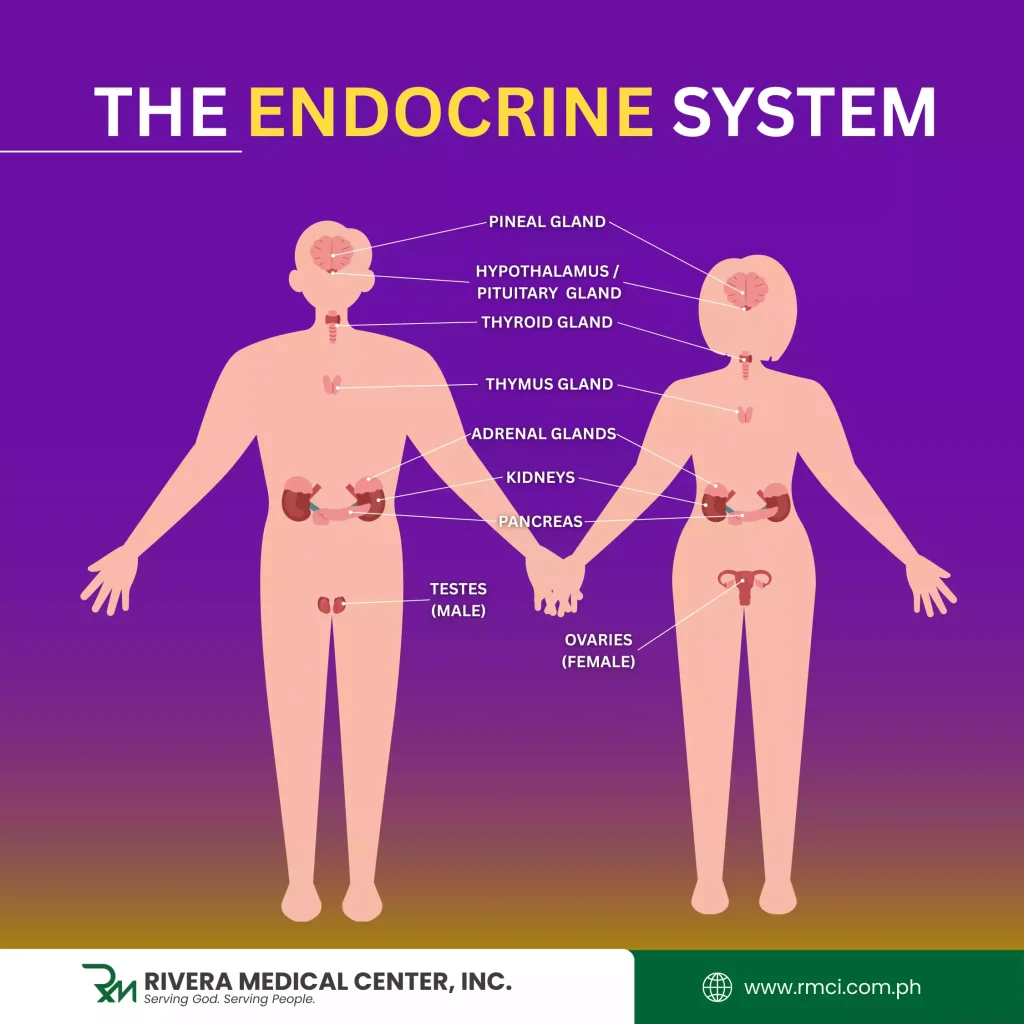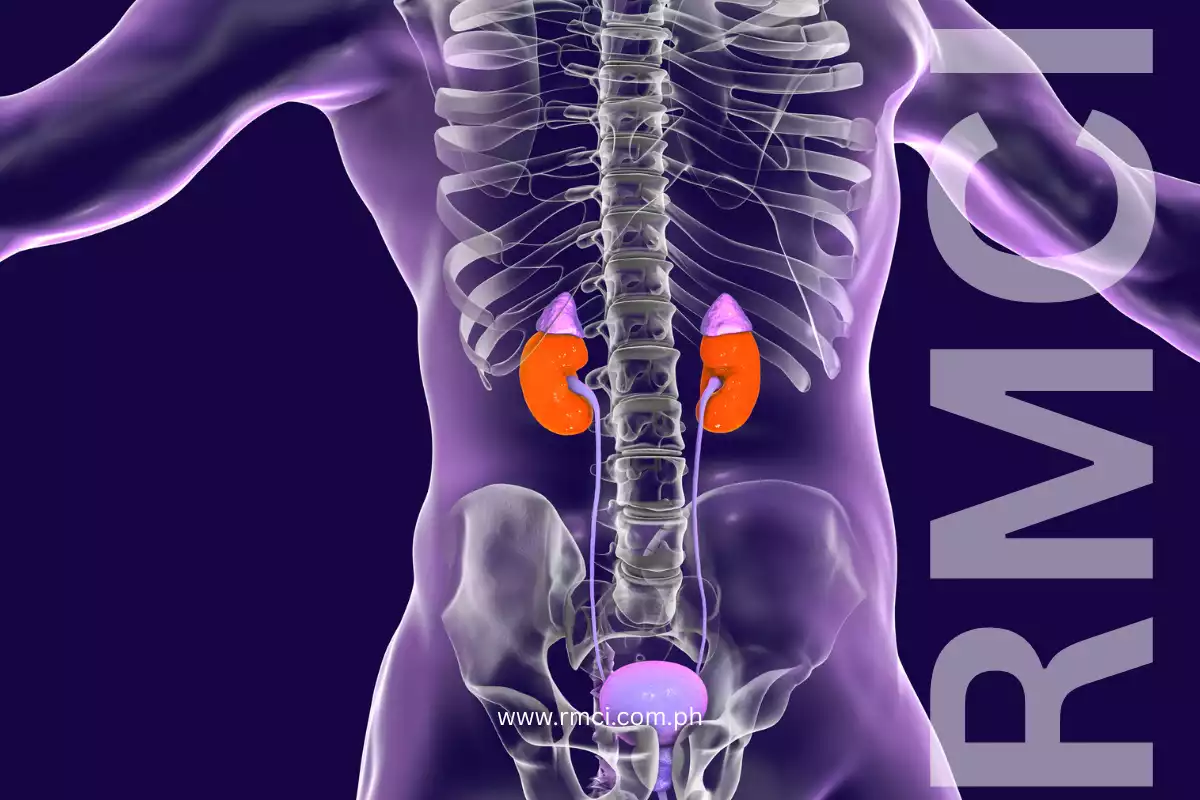If you’re looking for an endocrinologist in Panabo City, Tagum City, or in Davao del Norte, you can contact these medical professionals.
RMCI’s endocrinologists specialize in treating hormone problems in the body. Our endocrinologists are capable of helping people in Davao del Norte with hormone-related conditions.
What is Endocrinology?
Endocrinology is a branch of medicine and biology dedicated to the study of the endocrine system, its diseases, and the specific hormones it produces. This specialty encompasses research and clinical care for all hormone-related conditions in the body.
Endocrinologists focus on how hormones regulate the body’s development, growth, and metabolism. They also study the role of hormones in bodily functions like sleep, reproduction, and mood.

What are the Key Aspects of Endocrinology?
What are Hormones and Their Effects on the Body?
Hormones are powerful chemical messengers secreted by endocrine glands into the bloodstream. They coordinate different body functions by carrying instructions to the organs, tissues, and cells.
Every hormone released by the endocrine glands has a specific target. Only cells with compatible receptors respond to these instructions, ensuring that bodily processes are working together seamlessly.
Examples of major hormones and their effects include:
- Insulin: Helps regulate blood sugar, produced by the pancreas. Imbalances cause diabetes.
- Thyroid Hormones (T3, T4): Produced by the thyroid gland, these control metabolism, energy, and growth.
- Estrogen and Progesterone: Key female sex hormones, vital for reproductive health, menstrual cycles, and bone density.
- Testosterone: Primary male sex hormone, influencing muscle mass, body hair, and reproduction.
- Cortisol: The adrenal gland’s “stress hormone” regulates metabolism, blood pressure, and immune responses.
- Growth Hormone: Impacts body growth, development, and metabolism, especially during childhood and adolescence.
- Adrenaline: Triggers the “fight or flight” response in stressful situations.
Endocrinologists are experts in managing hormonal imbalance – condition where there is excessive or insufficient production of hormones. This imbalance dramatically affects mood, energy, development, metabolism, fertility, and even behavior.
What is the Endocrine System?
The endocrine system consists of a network of ductless glands and hormones that regulate almost every biological process, from conception through old age. At RMCI, endocrinologist help educate patients about major endocrine glands include the pituitary, thyroid, parathyroids, adrenals, pineal, as well as the pancreas, ovaries (in females), and testes (in males).
Key functions of the endocrine system include:
- Growth and development
- Metabolic rate and body energy balance
- Blood sugar regulation
- Reproductive functions
- Responses to stress and injury
- Fluid and electrolyte balance
Communication within the endocrine system is sophisticated. Processes often involve feedback loops to ensure hormonal balance (homeostasis). The thyroid-stimulating hormone (TSH) from the pituitary gland, for instance, controls the release of thyroid hormones from the thyroid gland.
What Conditions are Treated by an Endocrinologist?
Endocrinologists specialize in diagnosing and treating disorders related to the endocrine glands and hormones. Common conditions include:
- Diabetes mellitus: The most common endocrine disorder globally.
- Thyroid disorders: Hypothyroidism (underactive thyroid), hyperthyroidism (overactive), thyroid nodules, and goiter.
- Osteoporosis: Weakening of bones due to hormonal deficiency, especially after menopause.
- Adrenal disorders: Including Addison’s disease and Cushing’s syndrome.
- Pituitary gland disorders: Affecting hormone production that regulates other endocrine glands.
- Polycystic ovary syndrome (PCOS): Common in women, affects reproduction and hormone levels.
- Growth disorders: Such as gigantism or acromegaly in children or adults.
- Endocrine gland cancers: Tumors can develop in any of the glands.
How Do Endocrinologists Diagnose and Treat Endocrine Disorders?
Diagnosis
Diagnosis begins with a comprehensive medical history and physical examination of the patient. Endocrinologists look for tell-tale symptoms like unexplained weight changes, fatigue, mood shifts, or changes in the skin.
Key diagnostic tools used by endocrinologists include:
- Blood and Urine Tests: These tests are used to assess specific hormone levels, revealing deficiencies or excesses (e.g., TSH for thyroid function, glucose tests for diabetes).
- Imaging Scans: Ultrasound, MRI, and CT are used to examine gland size, structure, or detect tumors.
- Dynamic Function Tests: Stimulation or suppression tests are used to check how glands respond under certain conditions.
- Specialized Assessments: These procedures may involve glucose tolerance tests for diabetes or bone density scans to check for osteoporosis.
Treatment
When you see an endocrinologist, expect them to use treatments that are focused on restoring hormonal balance and alleviating symptoms. Some of these treatments include:
- Hormone Replacement Therapy: Used to address conditions like hypothyroidism, menopause, or adrenal insufficiency.
- Medications: To lower or block hormone production (e.g., antithyroid drugs), or enhance the body’s use of hormones (e.g., insulin or oral diabetes medications).
- Lifestyle Modifications: Diet, exercise, and stress management are strongly recommended by endocrinologists to significantly improve many endocrine conditions.
- Surgical Intervention: Occasionally needed for tumors or severe gland disorders.
- Patient Education and Support: Chronic endocrine diseases (like diabetes) require long-term management and regular follow-up, often in close collaboration with primary care providers.
What is the Most Common Endocrine-Related Disease?
Diabetes mellitus is, by far, the most common endocrine disorder treated by endocrinologists. This condition affects how the body produces or utilizes insulin, leading to abnormal blood sugar levels. High prevalence and rising diagnosis rates worldwide make diabetes the leading focus of endocrine care. In the Philippines, diabetes mellitus is one of the top 5 leading causes of death.
Many Filipinos are vulnerable to this condition because of many factors. In Panabo City, as well as Davao del Norte, as a whole traditional social practices such as gatherings and celebrations where eating and drinking are an integral part. The growing urbanization in Panabo City, in addition, also contribute a lot to sedentary lifestyle of its residents, especially younger adults. Sedentary lifestyles among younger Filipinos make it a challenge to stay physically active and healthy.
Other frequently encountered endocrine diseases in the Philippines include thyroid conditions (hypothyroidism and hyperthyroidism), metabolic syndrome, and osteoporosis.
Rivera Medical Center Endocrinologist in Panabo City
When Should You See an Endocrinologist?
If you are in Davao del Norte, you should consider seeing an endocrinologist if you have, or suspect you have, a problem with your glands or hormones. Consult an endocrinologist immediately if symptoms hormone-related persist despite standard treatments.
Key reasons to see an endocrinologist include:
- A diagnosis of diabetes or thyroid disorder needing management
- Unexplained weight gain or loss
- Persistent fatigue or muscle weakness
- Menstrual/pubic hair irregularities or fertility issues
- Persistent high blood calcium, blood sugar, or cholesterol
- Unusual growth patterns (in children or adults)
- Concerns over bone health or osteoporosis
- Cancers of endocrine glands
Your primary care physician may also refer you to an endocrinologist for expert evaluation when standard therapies are ineffective or when they suspect complex glandular conditions. RMCI has a seasoned endocrinologist in Panabo City who can provide specialized care for your intricate glandular system.
Consult with an endocrinologist in Panabo City
Endocrinology is fundamental to understanding, diagnosing, and treating the countless ways hormones influence human health. Through RMCI, endocrinologists in Panabo City can help you stay healthy, from your everyday metabolism to complex diseases. Timely consultation with an endocrinologist ensures optimal outcomes for both acute and chronic endocrine disorders.
Contact 09257076172 for any endocrine-related problems.



